The Hindu Editorial (The perfect storm) – Feb 26, 2022
The combative advent of the Russian military into Ukraine early Thursday has predictably spooked markets across all asset classes the world over. For further reading, visit “The Hindu”. Below is today’s word list-1 for The Hindu Editorial (The perfect storm) – Feb 26, 2022.
To read this article, click “The Hindu”.
This preview is provided here with permission.
Courtesy: The Hindu
The Hindu Editorial (The perfect storm) – Feb 26, 2022:
- perfect storm (noun) – a bad situation, a critical situation, a disastrous situation, a difficult situation, an unfortunate situation, fiasco, crisis, tragedy, quagmire.
- storm (noun) – trouble, disturbance, controversy.
- gambit (noun) – plan, stratagem, tactic, manoeuvre, measure/scheme, strategy.
- unravel (verb) – fail, collapse, go wrong, fall apart.
- assumption (noun) – expectation, reckoning, calculation, prediction, forecast, projection; premise, belief, speculation, surmise, conclusion, thought, notion.
- drive (verb) – cause something (conceptual) to happen; cause something (conceptual) to develop.
- combative (adjective) – aggressive, hostile, belligerent, bellicose.
- advent (noun) – arrival, appearance, emergence.
- predictably (adverb) – as expected.
- spook (verb) – shock, horrify, appal, panic, frighten.
- asset class (noun) – a group of assets (financial instruments, securities, bonds, shares, holdings, etc.) with similar characteristics, particularly in terms of risk, return, liquidity, and regulations.
- surge (verb) – increase/rise suddenly.
- stock market (noun) – equity market, share market, a stock exchange. It is where traders buy and sell shares of companies on a public exchange.
- tumble (verb) – fall/drop sharply, plummet, plunge, nosedive, slump, slide, fall, decrease, decline.
- bourse (noun) – stock market (in French); stock exchange.
- crash (verb) – fall, plunge, plummet, tumble suddenly.
- dip (verb) – decrease, fall, drop, decline, diminish, dwindle, slump, plummet, plunge.
- perilously (adverb) – dangerously, riskily, precariously, insecurely.
- mark (noun) – point, level, stage.
- flight to safety or flight-to-quality (noun) – it is a financial market phenomenon happening when investors sell what they perceive to be higher-risk investments and purchase safer investments, such as gold and other precious metals.
- amid (preposition) – in the middle of, surrounded by; during.
- mayhem (noun) – disorder, turmoil, chaos, havoc, disorganization.
- prop up (phrasal verb) – to give support; help, aid, assist; bolster, bolster up, shore up, buttress.
- yellow metal (noun) – gold.
- indices plural of index (noun) – a data figure reflecting something compared with a standard or base value; pointer, indicator.
- tumultuous (adjective) – fluctuating, bumpy, turbulent, inconsistent.
- swing (verb) – fluctuation, change, shift, switch, variation, oscillation; trend.
- inflation (noun) – simply meaning “cost of living”; increase of price level of goods & services and vice versa decrease of currency value.
- flare up (phrasal verb) – break out, burst out, start suddenly, erupt.
- Federal Reserve (US) (noun) – the central banking system of the United States (The Reserve Bank of India (RBI) is India’s central banking institution).
- signal (verb) – indicate, point to, signify.
- throttle (verb) – suppress, control/restrict, stifle.
- liquidity (noun) – the availability of liquid assets; liquidity means liquid assets; cash; (liquid asset is an asset which can be easily sold/converted into cash without losing its value); a measure of activity (i.e. the ability to buy or sell easily) in a market.
- pare (verb) – reduce, diminish, decrease.
- multi-layered (adjective) – having many layers.
- uncertainty (noun) – unpredictability, unreliability, riskiness/precariousness.
- nerve (noun) – anxiety, tension, nervousness, strain, stress, worry.
- on edge (phrase) – tense/nervous, apprehensive, uneasy/unsettled.
- diplomatic (adjective) – tactful, sensitive, subtle, delicate; consular, foreign-policy.
- fallout (noun) – adverse results/consequence; after-effects, repercussions.
- United Nations Security Council (UNSC) (noun) – it is one of the six principal organs of the United Nations, charged with ensuring international peace and security.
- seek (verb) – try, aim, attempt; ask for, request, appeal.
- condemnation (noun) – censure, criticism, castigation, stricture.
- sanctions (noun) – action taken, or an order given to force a country to obey international laws by limiting or stopping trade with that country, by not allowing economic aid for that country, etc (Courtesy: VOA Learning English).
- thus far (phrase) – so far, until now, up to this point.
- take a side (phrase) – support, back, give one’s support to, side with, be on the side of, stand by, stand up for, be supportive of, ally with, associate oneself with.
- double-edged (phrase) – ambiguous, equivocal, dual, two-edged, ambivalent, arguable, debatable.
- ramification (noun) – consequence, result, aftermath, outcome, repercussion.
- sitting on the fence (phrase) -undecided, uncommitted, uncertain, unsure, vacillating, wavering; to delay making a decision.
- extent (noun) – degree, range, scope.
- deter (verb) – prevent, stop, obstruct, avert, ward off.
- interest (noun) – common concerns (in politics/business).
- in terms of (phrase) – with regard to, regarding, concerning, in respect of, with reference to, in connection with.
- call (noun) – demand, appeal, request.
- the Society for Worldwide Interbank Financial Telecommunication (SWIFT) (noun) – Swift (the Society for Worldwide Interbank Financial Telecommunication) is the main secure messaging system that banks use to make rapid and secure cross-border payments, allowing international trade to flow smoothly. It has become the principal mechanism for financing international trade. In 2020, about 38 million transactions were sent each day over the Swift platform, facilitating trillions of dollars’ worth of deals.
- for now (phrase – for the time being.
- explicitly (adverb) – clearly, unequivocally, understandably, without question/doubt.
- fraction (noun) – tiny amount.
- account for (phrasal verb) – add up to, constitute, make up, comprise, form, compose, represent.
- pharmaceutical (noun) – aspects like preparation, dispensing, and effective utilization of medicinal drugs.
- Commonwealth of Independent States or CIS countries (noun) – a regional intergovernmental organization in Eastern Europe and Asia. It was formed following the dissolution of the Soviet Union in 1991. The CIS is an association that coordinates the facilitation of free movement of goods, services, labor force, and capital between member states. It also promotes cooperation on security matters. 12 States — Armenia, Azerbaijan, Belarus, Georgia, Kazakhstan, Kyrgyzstan, Moldova, Russia, Tajikistan, Turkmenistan, Ukraine, and Uzbekistan.
- freight (noun) – transportation, transport, carrying, delivery; goods, cargo, load, consignment.
- surge (noun) – a sudden increase/rise.
- crude oil (noun) – the raw natural resource that is extracted from the earth and refined into products such as gasoline, jet fuel, diesel and other petroleum products.
- drum up (phrasal verb) – try to get support (by urging/convincing/pressuring someone); gather, collect, get, obtain (support).
- inelastic (adjective) – relating to supply/demand which is unconcerned to changes in price.
- jump up (phrasal verb) – pick up, raise, rise, soar, increase.
- current account deficit (CAD) (noun) – the amount by which money relating to trade, investment etc going out of a country is more than the amount coming in.
- jeopardise (verb) – imperil, threaten, put at risk, put in danger, endanger.
- foreign exchange or forex (noun) – the conversion/trading of one country’s currency into another. Forex reserves are the amounts of assets /money in foreign currencies that a country has in its central bank (in India, it is Reserve bank of India).
- math (noun) – calculation, reckoning, tally.
- hinge on (verb) – depend on, be based, be dependent.
- assertion (noun) – declaration, statement, contention.
- Wholesale or Wholesale price Index (WPI) inflation (noun) – The change in the price index of the basket of wholesale goods (and no services) over a period of time is referred to as WPI-based inflation or wholesale inflation.
- Retail or Consumer Price Index (CPI) inflation (noun) – The change in the price index of the basket of consumer goods and services over a period of time is referred to as CPI-based inflation or retail inflation.
- accommodative (adjective) – aimed to encourage economic activity by reducing interest rates.
- stance (noun) – attitude, stand, point of view, viewpoint, outlook, standpoint, position.
- rethink (noun) – review, reconsideration, reassessment, re-evaluation.
- monetary policy (noun) – monetary policy refers to the use of monetary instruments under the control of the central bank to regulate magnitudes such as interest rates, money supply, and availability of credit with a view to achieving the ultimate objective of economic policy mentioned in the Reserve Bank of India Act, 1934.
- fiscal (adjective) – financial, monetary, budgetary.
- conservative (adjective) – cautious, understated, unexaggerated, moderate, reasonable.
- room (noun) – scope, chance, leeway, freedom, latitude, opportunity (for something to happen).
- preemptively (adverb) – preventively, precautionarily, protectively.
- nip (verb) – curtail, cut short, check, thwart, curb, stop, obstruct, impede, block.
- inflationary (adjective) – tending to cause monetary inflation.
- expectation (noun) – assumption, reckoning, calculation, prediction, forecast, projection.
- stoke (verb) – increase, raise, expand, amplify, escalate.
- faltering (adjective) – delaying, uncertain, unsteady/weak, precarious, irresolute, hesitant.
- sustain (verb) – continue, carry on, keep up, maintain, bolster up.
- fragile (adjective) – easily broken/destroyed, weak, risky, unreliable, insecure.
- churn (noun) – disorder/disorganization, confusion, disruption/chaos.
Note:
1. Click each one of the words above for their definition, more synonyms, pronunciation, example sentences, phrases, derivatives, origin and etc from http://www.oxforddictionaries.com/.
2. Definitions (elementary level) & Synonyms provided for the words above are my personal work and not that of Oxford University Press. Tentative definitions/meanings are provided for study purpose only and they may vary in a different context.
3. This word list is for personal use only. Reproduction in any format and/or Commercial use of it is/are strictly prohibited.
The Hindu Editorial (The perfect storm) – Feb 26, 2022:
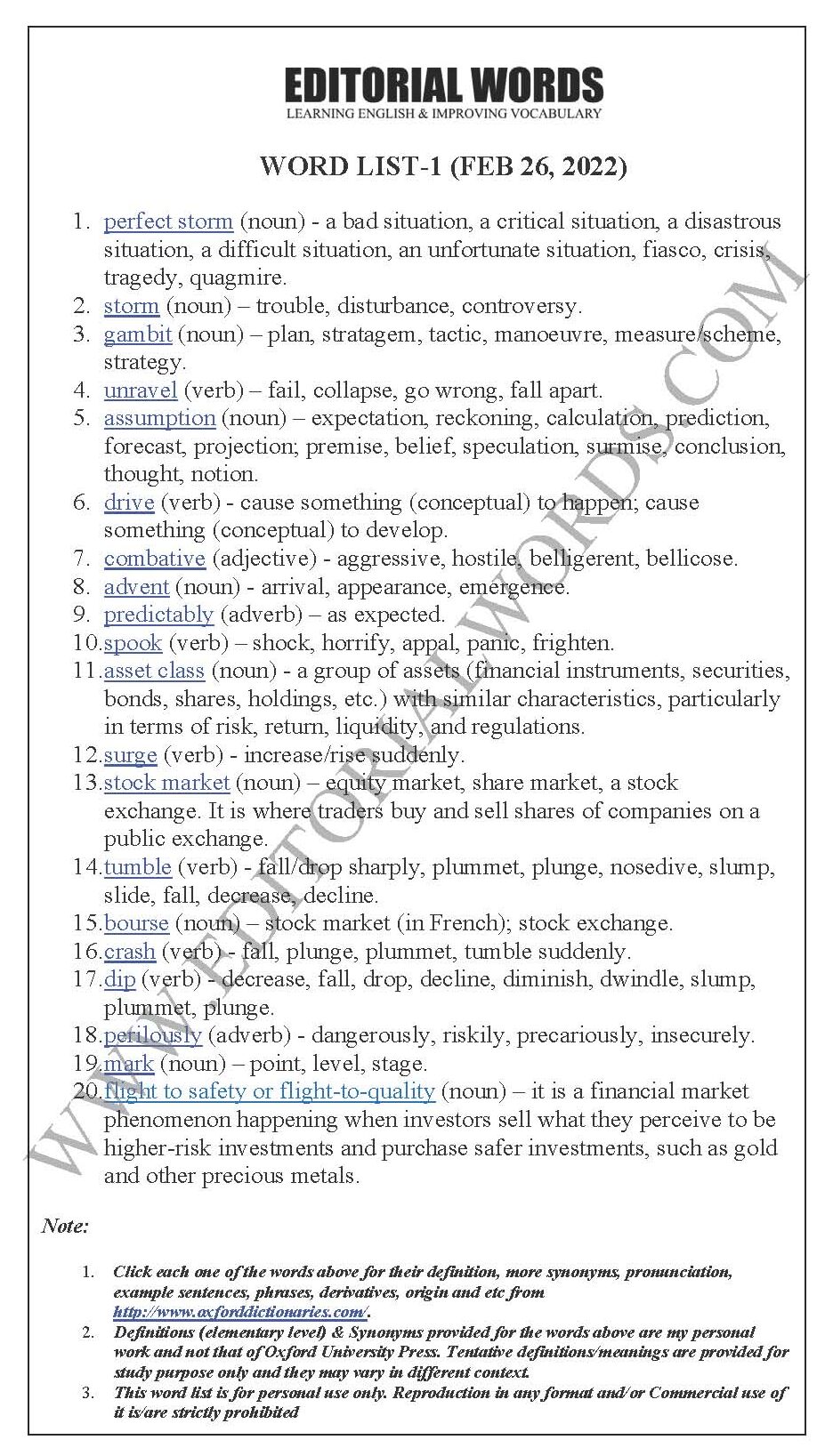
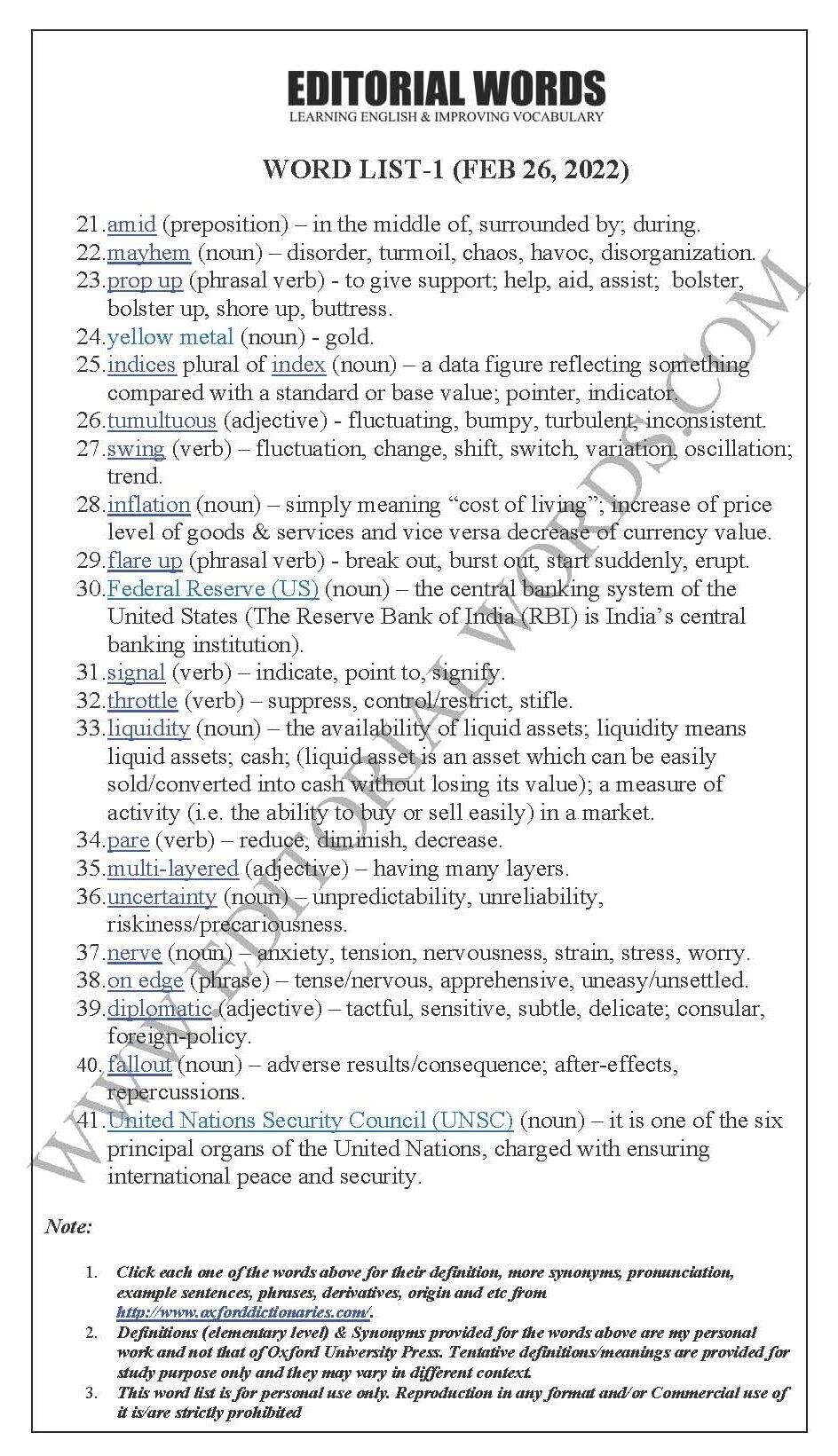
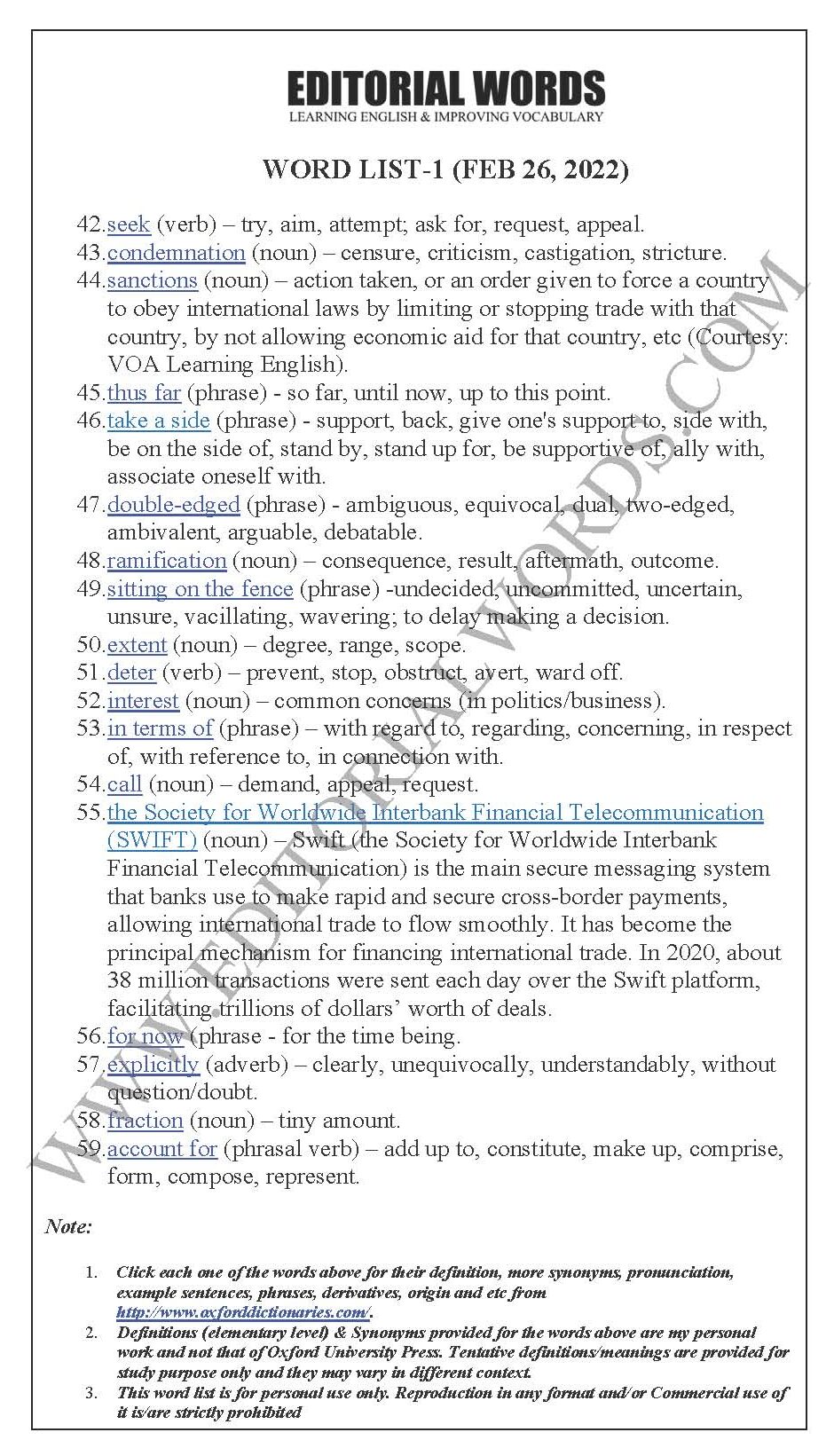
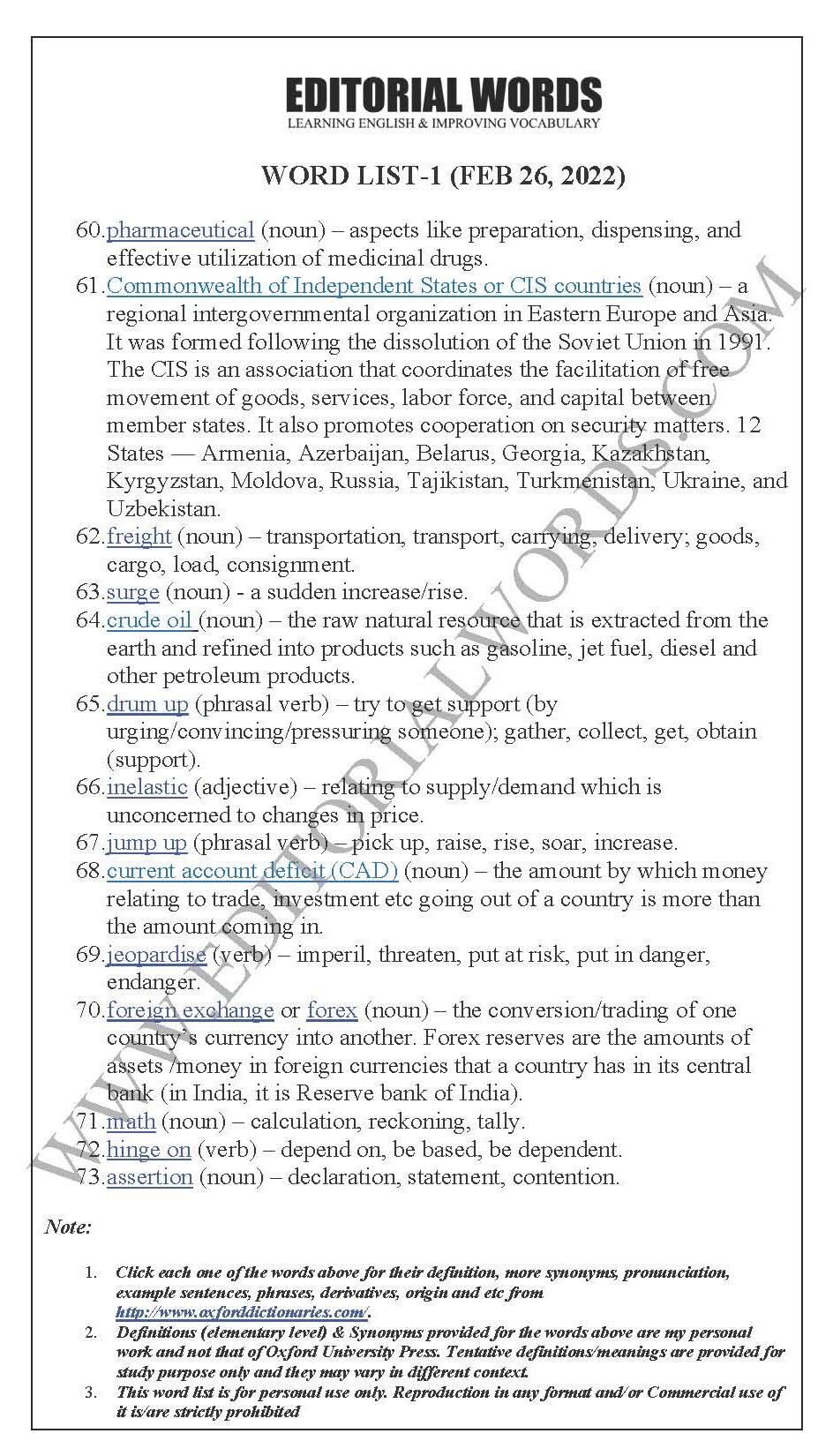
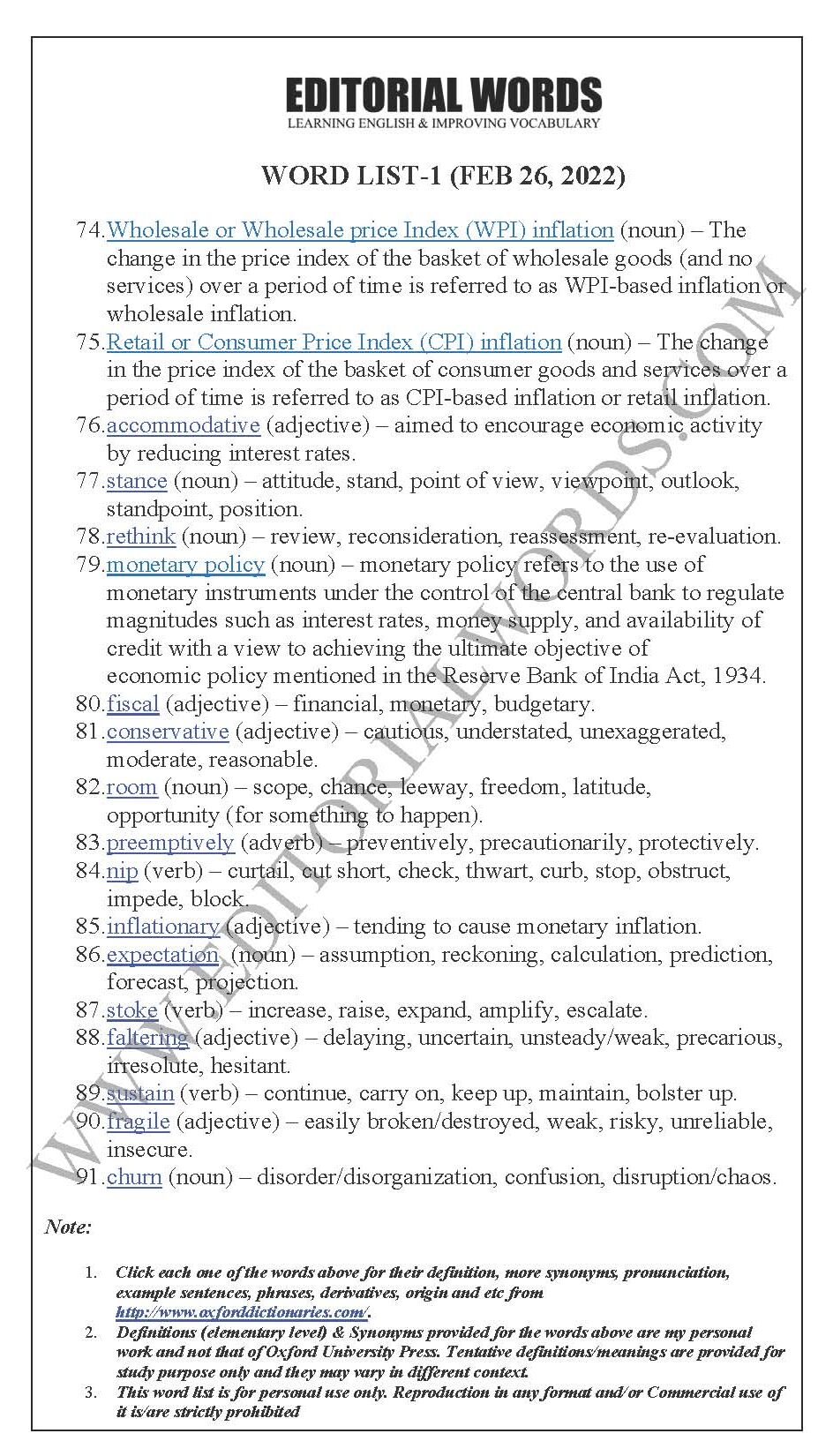
“Phrasal Verbs” We Learnt Last Week
“Idioms & Phrases” We Learnt Last Week
“Important Definitions” We Learnt Last Week
Recent Word Lists For The Hindu Editorial Articles

Be the first to comment